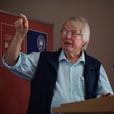The Institute for New Economic Thinking at the Oxford Martin School's Summer Research Meeting 2025 took place on 13 June 2025 at the Oxford Martin School.
The event included research updates from INET Oxford's five programme teams as well as two panel discussions: 'AI and New Economics', led by François Lafond, Karolina Bassa, Valentina Antonaccio and Matthew Bone; and 'Paradigm change in economics', led by Dennis Snower, Eric Beinhocker, J. Doyne Farmer and Cameron Hepburn.
In reviewing the academic year, Executive Director Eric Beinhocker gave some of the highlights across the four areas over which INET Oxford measures its impact: Scholarship; Public Policy; Public Debate; and Training the Next Generation.
Scholarship
The Centre had over one hundred publications across the academic year, and launched 18 working papers as part of the INET Oxford Working Paper Series.
Through our scholarship we've seen some major academic breakthroughs. Axtell & Farmer’s paper on Agent-Based Modelling in Economics and Finance: Past, Present and Future, published in the Journal of Economic Literature, was a significant moment for the field, suggesting that agent-based modelling has come of age. This sense of progress was reiterated by a Special Issue of the Journal of Economic Behaviour and Organization, coedited by seven researchers from INET Oxford, that showcased the growing relevance of complexity economics in offering solutions to the global policy challenges of the 21st Century.
The biggest impact paper of the year was published by the Climate Econometrics Team. Climate policies that achieved major emission reductions: Global evidence from two decades, which provides a methodology for ranking the effectiveness of 1,500 global climate policies, has been downloaded over 100,000 times and finished in the top 25 climate papers worldwide for media attention, being mentioned by 200 news outlets.
The Centre hosted 55 events across the year, including four seminar series, keynote Oxford Martin School Lectures, and Workshops.
Public Policy
Research from the centre has been taken on by policymakers across a range of areas including welfare and central banking.
The Austrian Minister of Finance announced €50 million for the further rollout of the job guarantee, citing the INET Oxford pilot project pioneered by Lukas Lehner and Max Kasy as the foundational evidence for this decision. The European Commission has also announced it is also funding further trials of this innovative welfare measure. The Centre has recently published an updated policy brief on welfare policy, reflecting these advances.
The Climate Policy Explorer tool developed by the climate econometrics team attracted the attention of the UK Government's newly appointed Head of Mission Control for Clean Power 2030, Chris Stark. Chris held a special panel discussion with our researchers in the Autumn.
Our Macroeconomics and Finance Team have had a significant impact in Central Banking, with a number of working papers being republished by central banks, including the Bank of Spain, Bank of England, Czech National Bank and South African Reserve Bank. Notably, John Muellbauer and Janine Aron's work with the Czech National Bank was acknowledged in the announcement that the bank's Governor Aleš Michl was to be recognised as Reserve Bank Governor of the year, having brought inflation down from 18% to 2%.
Public advocacy work in association Shelter from John Muellbauer, Sir David Hendry, Alex Teytelboym and Max Kasy also had a positive result, with the UK Government announcing £39bn for a new ten year affordable homes programme in the budget.
Public Debate
The Centre has helped shape public debate with articles in the Wall Street Journal, New York Times, Telegraph, BBC Radio 4; The Independent; Financial Times; The Economist and LA Times, tackling issues such as the energy transition, trade and climate change.
Training the next generation
INET Oxford is currently the largest training centre for new economics scholars in the world, with 212 alumni since 2012. The Centre currently has 35 post-docs and 25 DPhil students working on a range of projects.
Our scholars were recognised with a number of awards during the academic year.















